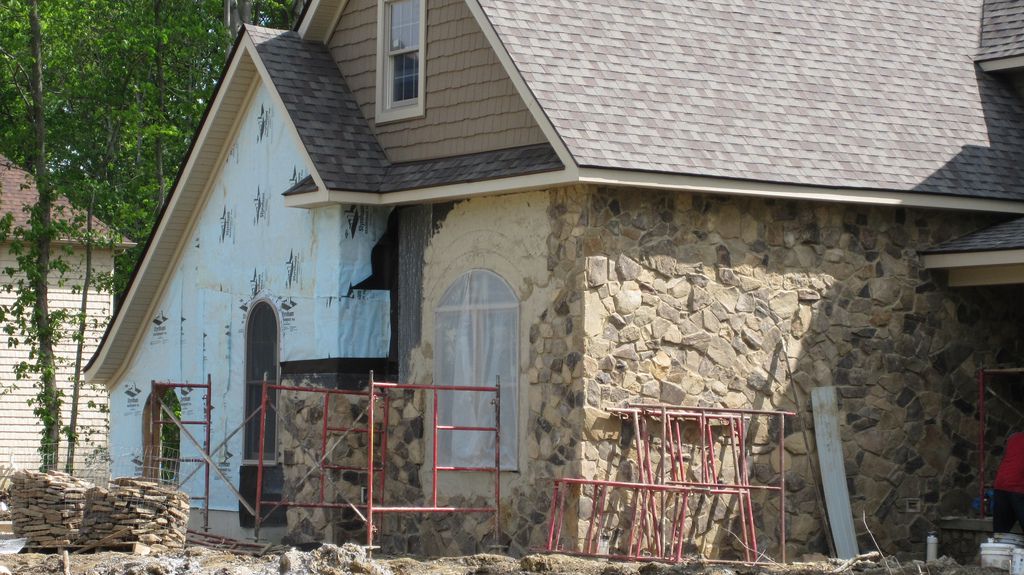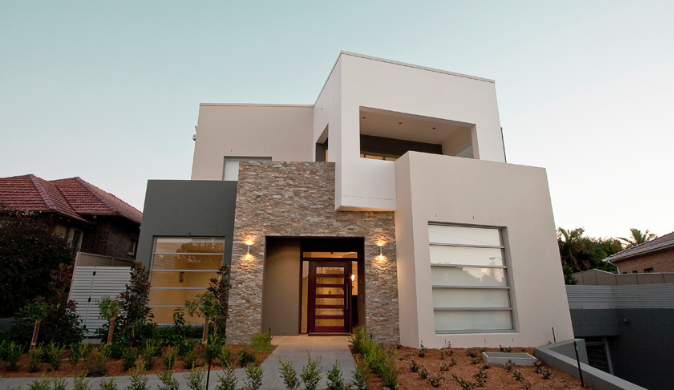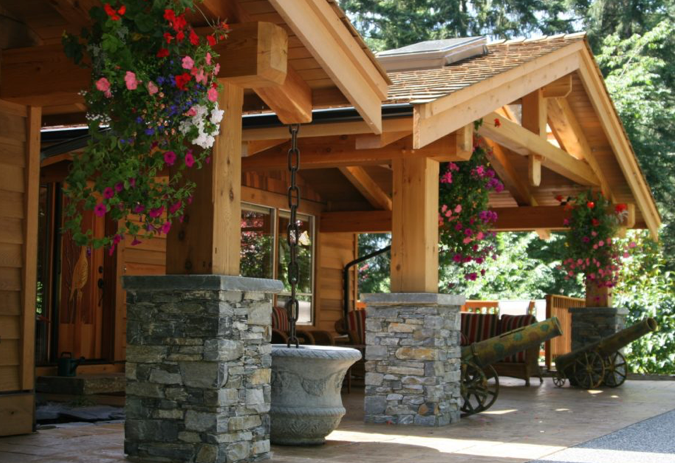Stone is a beautiful but costly option for full or partial home siding. The price of stone generally falls between $35 and $50 per sq. ft.. Homeowners can expect to pay about $42 per square foot when this siding is added to their entire home.
Stone shares many similar benefits to popular brick and can last longer than most other materials on the market. Its essential that it be installed carefully to prevent weakness, cracking, and eventual collapse. Improper installation can cause the siding to lose its resistance, which is why you should consider hiring a siding professional for large or important projects.
On This Page:
- Material Costs
- Natural Stone
- Stone Veneer
- Faux
- Cultured/ Manufactured
- Installing the Façade
- Partial/ Front of House
- Adding Stone Veneer Cladding
- Refacing
- Replacing
- Removing
- DIY or Hire a Pro
Cost of Building Materials
Average Costs of Stone Siding
| Material |
Per Square Foot |
How Is It Sold? |
| Real Solid Stone |
$42 |
By Sq. Ft. |
| Veneer |
$11 |
By Sheet (size varies) |
| Faux |
$6 - $10 |
By Sheet (size varies) |
| Cultured |
$5 - $8 |
By Sq. Ft. |
Natural Stone - $42 sq ft
Stone is another old building material with many forms. The most common types used in home construction are granite, basalt, limestone, and slate. Solid materials that havent been reconstructed come with many benefits because they are environmentally resistant, hard to damage, and retain a cool temperature in hot weather. Some of its downsides are its enormous weight, difficulty in retaining heat, and difficulty to replace when damaged. Like brick, it can be the main building material or an accent.
Stones cost different amounts based on their type. The most frequently seen varieties are typically priced at the following amounts. Consult a stoning installation professional for exact costs of your project by square foot.
Cost of Solid Stone
| Material |
Per Square Foot |
| Granite |
$15 - $30 |
| Basalt |
$7 - $11 |
| Limestone |
$20 - $28 |
| Slate |
$4.50 - $10 |
Sandstone can be used for siding, but buyer beware. Although attractive, it is not as durable as other rocks and is more likely to chip, break, and deteriorate over time. If you do want to use sandstone, determine whether or not your climate is suitable. The material works the best in hot, dry environments and should not be exposed to excessive moisture.
Stone Veneer Prices $11 sq. ft.
Veneers are placed over another material, such as a substrate or lower layer of timber or fiber cement, to create a solid exterior wall. They look like the real deal without the excessive weight or inability to retain heat, and are less expensive. However, the material is easier to damage and is susceptible to erosion and cracking from exposure to moisture and cold.
Faux - $6 - $9 sq. ft.
Faux stone is an extremely light, fake option that can be applied inside or outside. It is inexpensive at
$6 to $9 per sq. ft. and can be attached with regular mortar and materials. Faux stone can be used as a siding and is an environmentally resistant option, but not as much as regular rock. If you want to use this siding, know that you need to have an underlayment of drywall or timber on which to apply the material.
Cultured/ Manufactured Stone - $5 - $8 sq. ft.
This is a manmade variation of traditional materials. Concrete is poured into a mold and allowed to dry so that it resembles other products used for siding. It tends to be less expensive at
$5 to $8 per sq. ft., but is it a similar weight. Manufactured stone works as a durable, reliable siding. It possesses many of the pros of the real thing, but is less environmentally resistant.
Adding the Façade
The average price to develop a stone exterior for a 1,000-sq. ft. home is
$24,000 when you hire professional help. Masons will provide their own tools, but you need to supply the building materials. An experienced mason requests
about $19 an hour.
Stone is the most expensive siding, but also the most durable. You can choose from dozens of options and styles, and can customize your homes appearance. The downside is that it will not be cheap and will most likely require a professional. Stone is heavy and can cause severe damage to a homes foundation when installed incorrectly, so you need to be sure to invest in quality materials and labor for your project. Some of the items you will need are:
-
Masonry Mortar - 70-80 lb. bags for $10-$15: keeps your wall together.
-
Water-resistant Paper - $30: Apply on drywall behind masonry to prevent moisture damage.
-
Wall Sheathing - $2 and $4 per sq. ft.: Plywood that prevents damage to the wall.
Partial Installation/ Stoning the Front of a House
Stone is durable, but also heavy and expensive. To avoid some of its pitfalls and lower the overall remodeling price, many homeowners choose to stone only the front of their homes. To do so, the foundation in the front of the house needs to be shored up and given more support to hold the extra weight. This can be done through underpinning, which lengthens and widens the whole base. Underpinning is the most popular method because it reinforces the entire house. Check out our Foundation Raising Cost Guide for more.
Because of the expense and weight of full stone exterior walls, its becoming popular for homeowners to complete a partial installation. This helps reduce the cost of the entire installation as well as the walls weight on the foundation. Most vinyl siding costs between $3 and $8 per sq. ft., while real stone if between $36 and $42. A 1,000-sq. ft. homes exterior which is half stone and half vinyl will cost a homeowner between $19,500 and $25,000. This process is half of the cost of full walls.
Other options for partial installations include using it on the bottom half of a house or the entire first floor, around bay windows, as fireplaces or chimneys, or as an exterior accent. All of these varieties are available to homeowners and cost less than using stone around the entire house.
Cost to Install Stone Veneer Cladding
The average price to add a veneer surface is
$21,000 to $22,000 for a 1,000-sq. ft. home, making it one of the cheaper options to typical walls. Veneer shares some of the benefits of a standard stone surface such as increased durability and environmental resistance. The veneer uses real materials and thus can add extra weight, which a homes foundation needs to support. If you dont have construction experience, it would be wise to hire a professional who can calculate the additional pressure and install the veneer correctly. You will need many materials like:
-
Mortar - $10-$15 for a 70-80 lb. bag.
-
Masonry Nails - $5 for a 5-lb. pack.
-
Moisture Barrier - $2 to $4 per sq. ft.: Prevents water vapor from seeping under the wall and damaging the wall foundation.
Refacing with Stone
Refacing your home with stone can create a new look for your house and raise the value of the property. Stonework promises a higher ROI than many other materials, so it is a popular replacement material.
If you want to replace an existing siding, you need to take a few matters into account. First, can your existing underlayment and drywall support the weight of the new material? If not, then you will need to purchase new products and install them, which means you need to tear down the original surface. You can expect to spend anywhere between $9,800 and $18,000 to reface the front of a home. See the chart below to breakdown this total:
Costs of Refacing with Stone on at 250 Sq. Ft. Surface Area
| Underlayment |
$110 - $130 |
| Material |
$2,750 - $10,500 |
| Pro Installation |
$6,000 |
| Deconstruction |
$1,000 - $1,200 |
| Total |
about $9,900 - $17,900 |
Replacing
Stone siding is durable, but wont last forever. It can break down, chip, and crack from exposure to the elements, especially moisture and snow. The material is also heavy, which isnt ideal for people who live in wet environments where the ground and foundation can absorb moisture. If you feel like stone siding isnt right for you, then it might be time to replace it with another option.
-
Brick is less expensive and easier to replace than stone. It does not need to be painted, is environmentally resistant, and has high soundproofing value. It is also susceptible to frost damage and the grout can deteriorate over time.
-
Vinyl is inexpensive and extremely low-maintenance, with most varieties lasting between 25-40 years. However, it is not as durable as other types when faced with weather and environment damage.
-
Fiber cement is inexpensive, durable and flame-resistant material. It is mainly used in hot, dry areas at risk of natural fires. Stone is stronger and considered more visually appealing, but this type requires little maintenance.
Removing
To remove, you will need to use the old-fashioned chisel and hammer method. This requires demolishing the materials used to build the wall while leaving the underlayment and foundation intact. This process is
not a DIY project, as it is very likely for a novice to chip part of the stone and cause large sections of the wall to crumble. It is possible to be injured during this process, which is why homeowners should call a professional.
DIY or Hire a Pro?
When installing siding, its important to have the right tools. Most siding is placed over an underlayment and drywall, and it needs to be laid correctly or else it will warp. Its also possible to crack the stone if too much force is used on the masonry nails. Hiring a pro is an excellent way to avoid many of the hazards of DIY construction. The pro can also help raise the ROI value of the siding by ensuring it looks pleasing and will not crumble after a few years. But, what should you look for?
When hiring a professional, be sure to read reviews about the business or individual in which you are interested. You should determine whether the pro provides their own materials or will require you to purchase your own. Finally, check to see whether the person you want to hire can help you obtain permits. It can be hard for a homeowner to remain up to date with new zoning and construction laws, and many professional installers will know whether you need to fill out paperwork for your siding.




Leave a comment
This site is protected by hCaptcha and the hCaptcha Privacy Policy and Terms of Service apply.